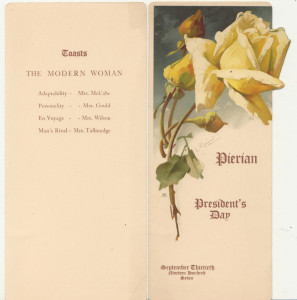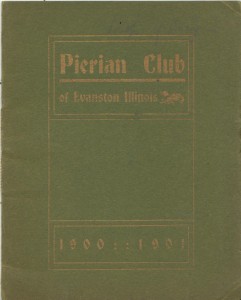By Janice Zulkey, Pierian Club Member
The end of the 19th century was a time of tremendous growth in the country. As the United States was developing into a capable national state there was a new emphasis on education and self-improvement across the country. For those who had limited opportunities for formal education, women in particular, the desire for intellectual stimulation gave rise to an explosion of clubs to fill that need. In order to have their opinions taken seriously on an astonishing number of issues like temperance, suffrage, career opportunities and independence, to be able to be real participants in the progress of their communities, women had to expand their minds beyond the limits of household responsibilities.

Inspired, twelve Evanston women met in 1891 to found Pierian, a “club for mutual self-improvement.” The name is derived from Greek mythology where the Pierian spring was sacred as the source of knowledge. It is referenced in the club’s motto, an excerpt from Alexander Pope’s Essay on Criticism: “A little knowledge is a dangerous thing. Drink deep or taste not the Pierian spring.”
The Pierian founders were already very active in the community. They were well-traveled, married to prominent businessmen, mistresses of stately Victorian homes. They were sophisticated enough to recognize that if there were to be a common wealth of culture in a growing Evanston, its women needed to be enlightened. Their path to accomplishing this was Pierian, which is still going strong.
In 1892 a pattern of study was established. An annual theme was chosen which would then be broken down into appropriate subheadings for scrutiny. During each meeting a member was expected to deliver a thoroughly researched paper on her selected topic, inevitably stimulating lively responses.

Pierians were intrepid about choosing their themes. The first was a thorough study of John Ruskin, the prolific art critic and social thinker. The rigor of their studies never ebbed. They investigated “The Industrial Arts” (1901), “The Georgians” (1933), “Literature of the Restoration” (1939), “Critics and Criticism” (1943), “Living Ethics” (1960), “Protest, American Style” (1972). More recently Pierians have studied Dynasties, Victorian England, Rivers of the World, Museums, Mexico, and Journalism, among others.
They continue to meet eight Mondays a year within one another’s residences. At one in the afternoon it begins with tea and dessert, then the members settle in to enjoy the day’s paper and special time for discussing it and the various topics it has provoked. Like their charter members they continue to support the Evanston Library with annual monetary contributions. Today’s 25 members are more formally educated than the founders. The great majority have master’s degrees, several have doctorates. They have all had careers. Most are former educators but their work experiences cover the fields of industrial engineering, social work, marketing, nursing, physical therapy, communications, library science and finance. Regardless, all enjoy exploring areas of knowledge well beyond the perimeters of their professions.
Its purpose is still the same and if the desire for intellectual challenges and exchanges remains strong there is every reason to believe that Pierian will continue for another one hundred and twenty-five years.
